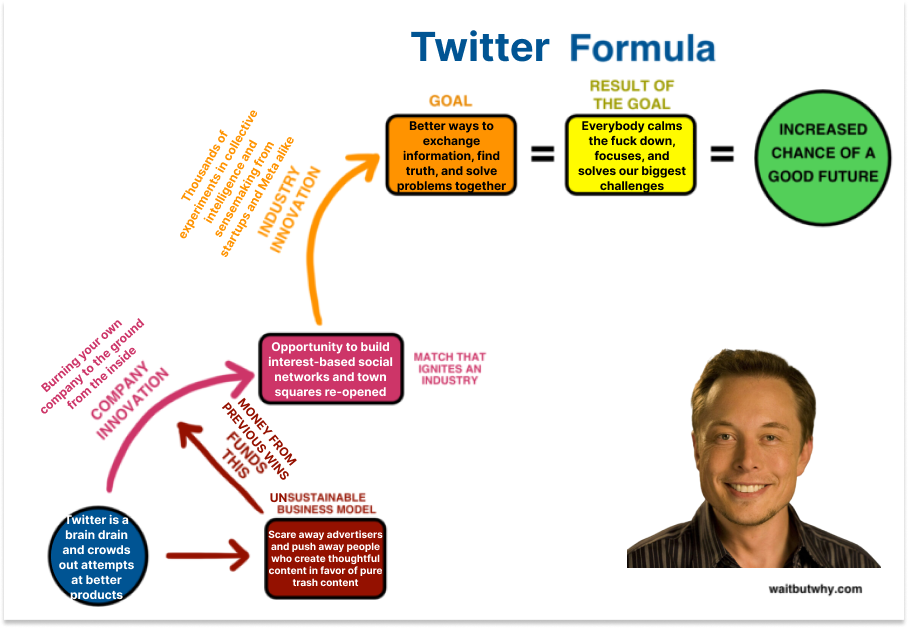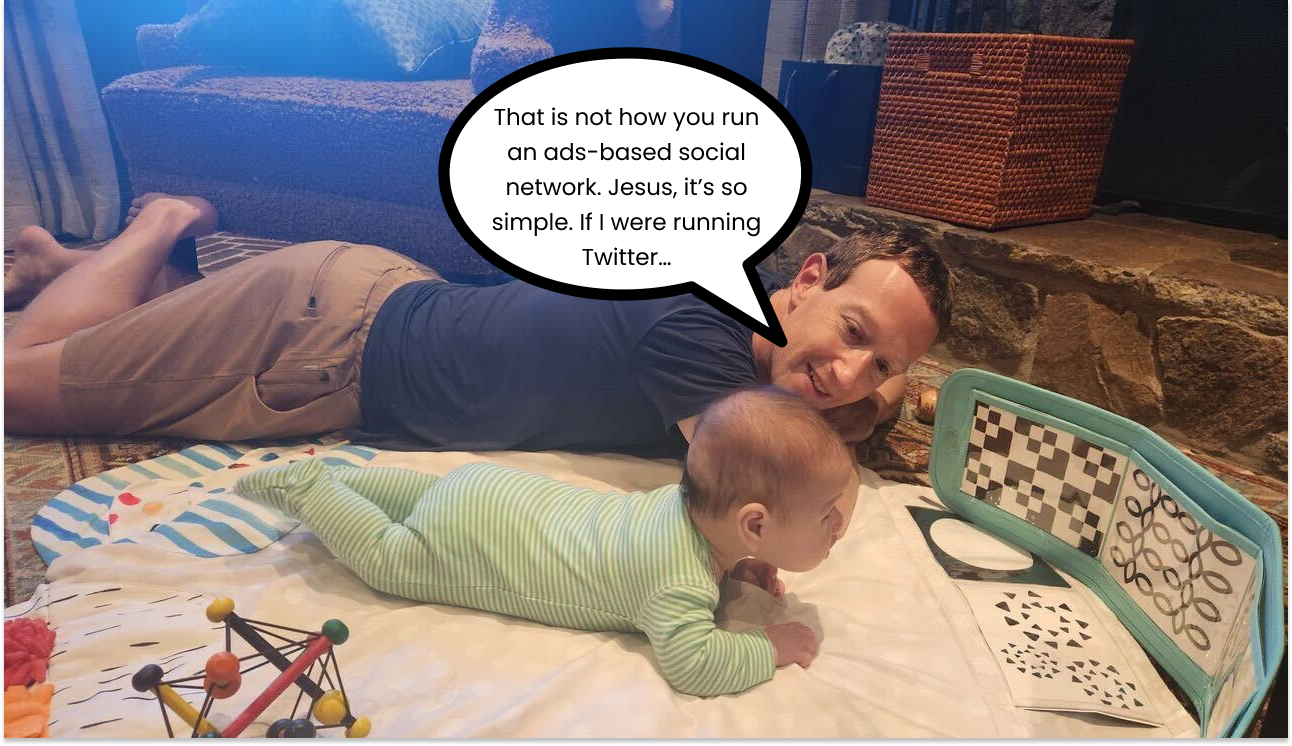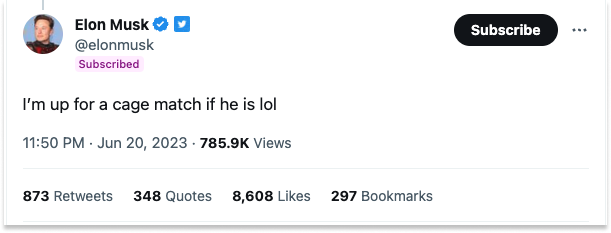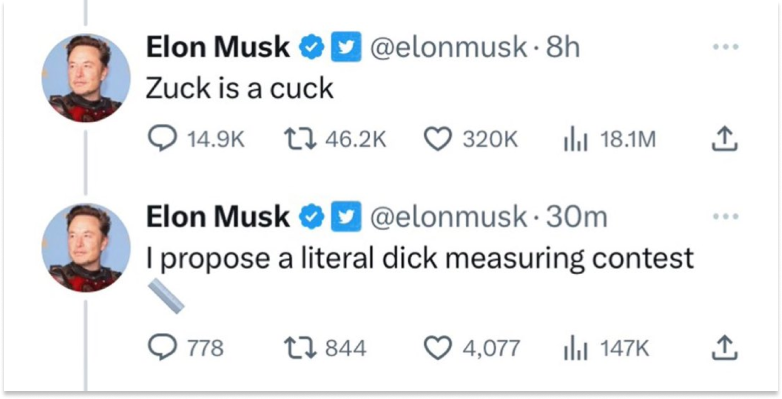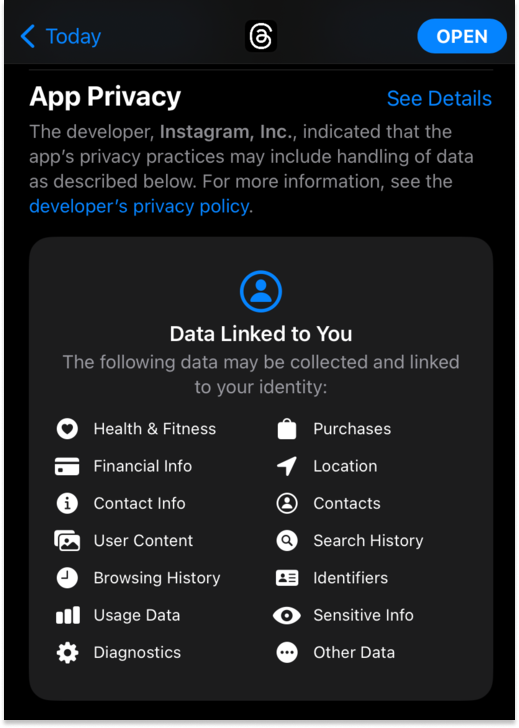

Praise Elon
source link: https://www.notboring.co/p/praise-elon
Go to the source link to view the article. You can view the picture content, updated content and better typesetting reading experience. If the link is broken, please click the button below to view the snapshot at that time.

Praise Elon
Elon is Killing Twitter to Save Us All
Welcome to the 1,142 newly Not Boring people who have joined us since our last essay! If you haven’t subscribed, join 207,475 smart, curious folks by subscribing here:
Today’s Not Boring is brought to you by… Tegus
Earnings season doesn’t have to mean late nights and frantic model updates—Tegus gives investors the most accurate company models and industry-specific dashboards with custom KPIs.
So instead of spending time sourcing and aggregating SEC data or manually updating your models with the newest data every quarter during earnings, Tegus’s team of sector-focused financial analysts does all that work for you, ensuring accuracy and speed you won’t find anywhere else.
If you want to thrive and not just survive this earnings season, click here to learn more about Tegus.
Hi friends 👋,
Happy Tuesday! Hope you’re all enjoying the heat, outside and online.
I’ve written a bunch about Twitter over the years. Maybe because it’s where I met so many of you, maybe it’s because I’m too terminally online, or maybe it’s because I’m an addict. As much as I want to stop, Twitter keeps pulling me back in.
According to some smart people, Twitter is dying. The experience isn’t fun anymore. Zuck entered the ring. Elon is messing up. Whatever the explanation, it feels like things aren’t going as planned at Twitter HQ.
Or are they? Of all of the billions of takes I’ve seen on Twitter, there’s one case I haven’t seen made: that Elon, in his beneficence, is killing Twitter on purpose to free us from its shackles.
Is this what I really think is happening? No. I’m not even convinced Twitter is dead yet.
My personal view on Elon, not that it matters, is that he’s the best atoms entrepreneur of our generation, that Tesla and SpaceX are unequivocally good things for humanity, and that very few people besides Elon, if any, could have pulled off what he did. But running a social network is a very different beast – people don’t bend as predictably as metals. Someone can be world-class at some things and not as good at other things, particularly when they analogize from experiences that aren’t exactly analogous.
But that’s not fun. That’s not going to get the clicks. If I’ve learned anything on Twitter, it’s that you need to take a stand, and you need to defend it no matter the facts on the ground.
So for today, I’m going to LARP as one of those weird nerds who defends Elon’s every move.
Let’s get to it.
Praise Elon
Whitepill: Elon Musk is intentionally killing Twitter for the good of humanity.
Elon Musk is the richest person in the world by $18 billion. He’s a member of the PayPal Mafia. He made electric cars happen. He made reusable rockets happen. He’s going to hook our brains into the Matrix. He said that AI was scary before everyone else said that AI was scary. He’s single-handedly solving the population crisis. He thinks about everything from First Principles™️.
You think that Elon Musk couldn’t figure out how to save a silly little app like Twitter? Please!
No, if Twitter is dying, it’s because Elon wants it to die.
First things first: is Twitter dying? I’m no social media expert, but my favorite social media writer, Eugene Wei, just dropped an excellent eulogy for it in How To Blow Up a Timeline, blaming changes to the algorithm for its downfall:
The Twitter graph, more than most, is an interest graph assembled from a bunch of social graphs standing on each other’s shoulders wearing an interest graph costume. Not perfect, but not nothing.
The new Twitter algorithm tossed that out.
He concludes: “I haven’t churned yet, but at the very least, I’ve asked the bartender to close out my tab.” Good enough for our purposes; it’s dying.
Which brings up the next question: if Twitter is dying, and Elon Musk is running it, and Elon Musk is the smartest person alive, then why would Elon want to kill the company he just spent $44 billion on?
Why Would Elon Want to Kill Twitter?
Everything Elon does is in service of increasing humanity’s chances of a good future, and Twitter is hurting our chances of a good future.
It’s a time suck, a focus killer, a rage generator. It’s always been those things; the good just outweighed the bad if you played it right. That’s increasingly no longer the case.
It’s fun to get mad at Elon, but let’s be honest, Twitter was going downhill before Elon. It peaked during lockdowns, and it’s gotten straight up worse since.
My best theory for why is that the Rules of the Game became too legible.
Write threads, and tell people to like and RT the first tweet once they get to the end. Share videos, not links. Talk about how bad things are now and how good they used to be. Dunk on people with big followings. Write the snarkiest possible replies. Get rewarded with likes, RTs, and followers, turn those into online courses or affiliate links or whatever.
Everything seems to grip our attention although we’re not particularly interested in any of it.
To be sure, the new For You feed and updated algorithms have made the problem worse, but they’re just accelerants. The people who’ve chosen to bend over for the algorithm are being rewarded and it’s made the experience worse for everyone else. It’s made us a little stupider as a species.
One of people’s more grounded worries about large language models (LLMs) is that it’s going to make online content incredibly mid by reading everything on the internet and spitting back something that looks roughly like the average of everyone's thoughts. A smoothing and dulling. Meanwhile, on Twitter, people are already doing that to themselves: molding their content to please the algorithm.
In the same way that SEO dulled the internet by nudging people to make websites more formulaic and less creative, and made it worse by serving people the most SEO-tuned content instead of the best content, Twitter’s algorithm dulled us, or at least our characters in the Great Online Game, by nudging people to be more formulaic and less creative, and made us worse by serving us the most algorithm-tuned content instead of the best content.
Obviously, tweets that make people angry get more engagement, which probably isn’t healthy, but the more subtly destructive aspect is just that we pour the contents of our brains into molds that fit the algorithm’s desires, and lose some of our novelty in the process.
And we would have hobbled along down this path, slowly, for years or even decades. Wei points out that inertia and “network effects can keep the party going long after last call.” Twitter has been hilariously poorly run from the business perspective, but it’s also been maddeningly hard to displace. Network effects and accumulated status and curated interest graphs are hard things to overcome.
In the steady state, we would have wasted hundreds of thousands of brain-years on Twitter, mindlessly scrolling, getting angry at each other for things we didn’t know we cared about, pretending that time spent on Twitter was actually useful for work, for staying in the flow of information, and resting uncomfortably in the knowledge that distraction from deep work was never more than a click away.
But the steady state didn’t persist. Elon saved us. Praise Elon.
The Deranged Whitepill Explanation for Twitter’s Demise
One of the most bizarre things on the internet is watching hundreds or thousands of random people jump to Elon Musk’s defense any time he does anything. It makes me a little sad every time I see it, that there are people out there who just want to be noticed by Elon badly enough that they’re willing to throw their honor and dignity to the wind at the drop of a Notification.
The simping is tough to watch, but honestly, the worst part is that their defenses just aren’t that creative. If Elon is playing 3D Chess, they’re praising him for a double-jump in Checkers.
Take the fact that they believe that since Elon founded Tesla and SpaceX, of course he knows how to run something as simple as Twitter, which is pretty much just a website with some text, pictures, and an algorithm. It’s not rocket science…
What they couldbe arguing is that Elon is sacrificing his own reputation to teach everyone an important lesson on the duality of man, to show us not to blindly worship false idols, or at the very least, to set an example for all of the entrepreneurs out there that building physical things requires a completely different skill set than running a social network. He’s showing a generation of potential deep tech entrepreneurs the folly of building software products so that they might put their talents to work towards Good Quests. Praise Elon.
Or the free speech issue. Elon has stated that he wanted to buy Twitter to bring back free speech. Whenever he does anything un-free-speechy, they bend themselves into thought-pretzels explaining why throttling Substack links or giving into government demands is actually really good for free speech. That’s missing the forest for the trees. It doesn’t give Elon’s genius and selflessness nearly enough credit.
In Neuralink and the Brain’s Magical Future, Tim Urban explains Elon’s Company Formula:
His initial thinking about a new company always starts on the right and works its way left.
He decides that some specific change in the world will increase the likelihood of humanity having the best possible future. He knows that large-scale world change happens quickest when the whole world—the Human Colossus—is working on it. And he knows that the Human Colossus will work toward a goal if (and only if) there’s an economic forcing function in place—if it’s a good business decision to spend resources innovating toward that goal.
When Elon bought Twitter, the whole free speech thing was a diversion. He knew it wasn’t fixable. He knew that highlighting more bumfights and far-right conspiracy theories in the For You tab wasn’t going to save democracy. He knew that AI was only going to make the bot problem worse, and that fresh new architectures would be needed to solve it.
In his omniscience, he knew these things and more, and he knew that the only way to Increase Humanity’s Chance of a Good Future was to burn Twitter to the ground.
What’s happening at Twitter is the work of an experienced, generational entrepreneur at the peak of his powers looking for a new challenge. With Twitter, he took his playbook and did the exact opposite.
Instead of creating a sustainable business model in a frontier industry without one, Elon took a sustainable model from an existing industry and made it unsustainable.
Instead of lighting a match that ignites an industry by showing others how something seemingly impossible can be done, Elon set the match to his own company that he just spent $44 billion on in order to clear room for thousands of new experiments.
Elon knows, obviously, that competition and experimentation are good, and he saw that Twitter’s would-be-startup-competitors were barely making a dent. He must have read Wei’s Status-as-a-Service; he knew that as long as Twitter was operating at status quo, its network effects would crowd out any new entrants – look at Mastodon, look at Bluesky. Twitter dominated text, and no one was going to topple it with the same proof of work people had invested so much time and effort in on Twitter.
With Twitter out of the way, though? A whole world of possibilities opens up. Entrepreneurs could once again build competitors. So he made room for startups to topple Twitter.
In his infinite wisdom, however, Musk knew that he couldn’t leave the future of global human communication to the experiments of novice entrepreneurs alone. He realized that he needed the best mind in social networking – the literal star of the movie The Social Network – to work on killing Twitter with him.
But Zuck was distracted. He was focused on the Metaverse. Twitter had been a lame duck target for years, but even Zuck, connoisseur of the copy-paste, couldn’t be bothered.
The opportunity didn’t look big enough based on Twitter’s revenue and thin profits. Even if it were, it would be hard to peel away Twitter’s power users, the deranged folks who thrived in 280 characters. And frankly, Zuck seemed content: working out, spending time with his family. Why would he possibly want to deal with all that headache for so little upside?
Undeterred, Elon devised a plan, and I’m getting goosebumps just thinking about it:
Drive away advertisers.
Piss off power users.
Appeal to Zuck’s physicality.
Feign weakness by rate limiting users.
Challenge Zuck’s manhood.
Just exquisite work. Let’s check the tape.
First, almost immediately, he drove away advertisers. Advertisers on Twitter have the patience of saints; they accepted the worst ads product in the business for years. And within days, Elon was able to scare them off.
You can almost picture Zuck, sprawled on the floor teaching his baby to see shapes, muttering to himself, “That is not how you run an ads-based social network. Jesus, it’s so simple. If I were running Twitter…” Hook, line, and sinker.
But advertisers do not a social network make. Users do. And Twitter’s power users were still addicted. Challenge accepted.
Elon pissed off Twitter’s power users enough that they were willing to try something new, despite the social capital they’d built up on Twitter and the shittiness of alternatives. He throttled their reach. He forced them to pay $8/month for Blue Checks. He messed with their perfectly curated feeds. He killed Substack links. He turned his stars into free agents. This was pure Zuck-bait:
“They’re willing to try something else,” Elon telepathically taunted, “But those other guys sure don’t seem to know how to build social products…”
Next, he appealed to Zuck’s physicality. This is a guy who killed everything he ate for an entire year, a guy who proudly talks about his Jiu Jitsu practice, a guy who completed the Murph challenge in 39 minutes and 58 seconds. And Elon challenged him to a cage match:
Zuck, of course, said yes, or more specifically: “Send Me Location.” Elon was getting close.
As one last bit of product bait, a week ago, heading into 4th of July weekend, Twitter rate limited its users, ostensibly to prevent scraping but maybe because Twitter’s infrastructure was breaking, which must have been catnip to a guy whose company motto is “Move Fast With Stable Infrastructure.”
It worked. On July 5th, probably fresh off kitesurfing with a big American Flag kite, Zuck announced his Twitter clone: Threads. The product looked almost identical to Twitter, but with more Instagram people. Zuck was in the race.
But Elon has been living the hell of running Twitter for nearly a year. He knows how hard it can get, and he wanted to make sure that Zuck stayed motivated to build something truly great despite the inevitable challenges.
So for his master stroke, the cherry on top, Elon challenged Zuck’s manhood, calling him a “cuck” and proposing “a literal dick measuring contest.”
You think Zuck is going to quit now? No chance. Zuck is now unknowingly doing Elon’s bidding. They’re teaming up to kill Twitter. That’s the real Jiu Jitsu.
And just like that, Elon accomplished another mission, barely breaking a sweat, in no time at all.
Elon officially acquired Twitter on October 27, 2022. In just three quarters, he’s managed to decimate the product, push away advertisers, repel power users, revitalize the social network entrepreneurial community, and goad Mark Zuckerberg himself into building a competitor. In just three quarters.
All because he realized before the rest of us that Twitter was diseased, and the disease was spreading to all of us, but it wasn’t quite diseased enough to die on its own. He sacrificed his time and reputation to kill it for the benefit of us all, to increase our chance of a good future. Praise Elon.
Anyway, I’m not saying that’s what Elon was thinking, but I’m saying that’s what I would be saying if I were one of those weirdos who defended Elon’s every move.
Why It’s Probably Good That Twitter Is Dying, Whether Elon Meant to Kill It Or Not
Intentional or not, though, who cares? The end result is … good.
I say this as someone with a crippling Twitter addiction, a large following on Twitter, and practically no following on Instagram or Threads who built a business on the back of Twitter distribution. It would be great for me if we got 2020 Twitter back. I wish Twitter were still the place that it was, but it’s not.
Despite my personal interests, I think Twitter’s demise is good on a bunch of different levels.
At the most basic, it’s probably healthy for us all to spend less time on Twitter.
Of course, Twitter can be a great way to discover new information, make friends, find opportunities, and understand diverse viewpoints. But it feels more difficult to get those benefits today than it used to, probably because the current paradigm is played out and has reached the natural endpoint of legible algorithmic feeds. Noise outweighs signal to such an extent that there are more nutritious ways to gather information and people.
Speaking personally, my brain feels more scattered and my focus less focused when I spend more time on Twitter. When I deleted the Twitter app from my phone for a few weeks, my mind felt noticeably cleaner, even if I checked Twitter on my laptop and occasionally on my mobile browser.
Starting with questions I want to answer then reading books, reading Substacks, going down rabbit holes with ChatGPT on specific topics, and having good old fashioned conversations with people tends to be a lot more fruitful.
Without Twitter pulling our attention away every few minutes, we should be able to get more deep work done, come up with fresher ideas, and have the time and space to implement them more completely. I, for one, can’t wait to see how productive Elon himself is when he can’t Tweet anymore. Fusion? Longevity? Mars? All on the table.
One level deeper, we need new forms of idea-based social networks.
Just because Twitter may be dying does not mean that we won’t need ways to connect online.
The consumer internet really started to take off in the late 90s. Twitter was founded in 2006. None of this stuff is that Lindy, and I find it very hard to believe that we’ve already arrived at the ideal way to exchange information and ideas across billions of connected people. WE ARE STILL SO EARLY.
With Twitter sucking less of the oxygen out of the room, there should be an opportunity for more startups with novel approaches to capture peoples’ attention and turn it into something productive or at least fun. Farcaster, Notes, Subconscious, even weirder stuff. Small, cozy group conversations. Shared canvases. Bring it all on.
I hope and expect that we’ll see a wide array of text-based attempts to get people to think together – products that start with a question and reward people for contributing to an answer, products that encourage well-researched debate on hard topics, products designed from the ground up for a world in which AI exists and can help but in which human connection is still crucial. Maybe we’ll even reallocate some of our Twitter time to touching grass together, in-person.
And then there’s Threads, and Meta more broadly.
Threads hit the 100 million user mark in under five days, shattering ChatGPT’s recent record. That’s incredibly impressive. The product doesn’t feel like it’s quite there yet for me, but part of that might be the dread at trying to rebuild a social graph from scratch after years of focusing on Twitter and ignoring Instagram.
In its current form, I don’t think Threads will replace Twitter – it rewards the same stuff that Twitter does, and as Wei wrote: “To succeed at carving out unique space in the market, social networks offer their own unique form of status token, earned through some distinctive proof of work.” There’s nothing distinctive about what it takes to get big on Threads besides having a large existing Instagram following.
But it’s early, and Adam Mosseri and team keep saying that they’ll continue to evolve the product. I wouldn’t be surprised if they figured it out. It’s hard to bet against Zuck. (If he wants to go for the jugular, he should acquire Substack, btw.)
That said, I don’t think replacing Twitter is the end game for Meta. What if Meta is going after a larger prize?
If I were building the open, social metaverse in a battle with Apple’s closed, personal one, I’d want to make sure that my user’s social graphs reflected the people they actually wanted to spend time with. Facebook and Instagram’s graphs are stale. Maybe Threads is a way to get people to refresh their interests and connections so they feel more at-home in the metaverse.
If I were building an open-source foundational LLM in competition with OpenAI’s closed one, being able to collect all of this training data from hundreds of millions of users in real-time seems like it might be pretty useful:
The open web is getting less open as companies like Reddit and Twitter lock down their content so that they can charge companies like OpenAI and Google a shitload of money for access. It’s rumored that scraping for AI models is one of the reasons Twitter recently rate limited its product. Instead of messing around with all of that, Meta can just try to get as many people to share their thoughts, conversations, and analysis for free on Threads and use it to train better and better versions of LLaMA.
Zuck can play 3D Chess, too. Whether or not Threads becomes a much better, bigger, and more profitable version of Twitter, and whether or not it kills Twitter, Zuck & Co. can pull a lot of value from the product for its bigger bets on the Metaverse and open-source AI. Of course, Meta can also use the information you give it in Threads to serve you more relevant ads across its Family of Apps.
Either way, Meta has shown a willingness to be a more open alternative to its more closed competitors, whether out of the goodness of their hearts or market dynamics, as I wrote about in Minimally Extractive Meta. I think it’s a good thing for the world to have open alternatives to OpenAI in AI, and certainly to Apple in AR/VR/MR, and Twitter fumbling the bag might contribute to that positivity in its own indirect way.
Taken together, Twitter’s loss is our gain. We’ll spend less time on Twitter and get time back for more productive and fulfilling things. Entrepreneurs will have the space to come up with novel evolutions of text- and ideas-based social products. And Meta might even get the fodder it needs to make big tech more open.
Post-Twitter
It’s so early in the history of the internet that the odds were always stacked against the first generation of social products – Twitter, Facebook, Instagram, Reddit, and the like – were going to be the ideal form of social products.
Zooming out, in a few decades, they’ll likely be remembered as early experiments that subsequent generations of entrepreneurs learned from to create better ones. But network effects are a hell of a drug, and devilishly hard to overcome. Even if this generation of products weren’t perfect, they were locked in.
Whether through incompetence or benevolence, Elon is breaking social’s shackles by killing what made Twitter just special enough to hang on. The world will be better for it. Praise Elon.
…Or Twitter will find a way to cockroach itself back into our hearts and back onto the top of our Screen Time Reports, and I’ll have just wasted even more time talking about this beautiful, terrible, frustrating app for nothing.
There’s only one way to find out. See you on Twitter.
Thanks to Dan for editing, and to Elon and the whole Twitter team for the constant firehose of content.
Recommend
About Joyk
Aggregate valuable and interesting links.
Joyk means Joy of geeK





